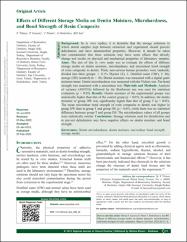Effects of different storage media on dentin moisture, microhardness, and bond strength of resin composite
Citation
Yilmaz, F; Guvenc, P1; Pamir, T2; Demirbas, A; Sen, BH3. Effects of Different Storage Media on Dentin Moisture, Microhardness, and Bond Strength of Resin Composite. Nigerian Journal of Clinical Practice 26(2):p 211-216, February 2023. | DOI: 10.4103/njcp.njcp_498_22Abstract
Background: In in vitro studies, it is desirable that the storage solutions in which dental samples kept between extraction and experiment should prevent dehydration and have antimicrobial properties. However, it should be taken into consideration that these solutions may have some effects that directly change test results on physical and mechanical properties of laboratory samples. Aims: The aim of this in vitro study was to evaluate the effects of different storage media on dentin moisture, microhardness, and microshear bond strength of resin composite to dentin. Thirty non-carious human premolars were randomly divided into three groups: 1. 0.1% Thymol (T), 2. Distilled water (DW), 3. Dry storage (DS) (control) (n = 10). Dentin moisture was measured with a digital grain moisture meter. Dentin microhardness was measured with the Vickers test. The bond strength was measured with a microshear test. Materials and Methods: Analysis of variance (ANOVA) followed by the Bonferroni test was used for statistical evaluation (p = 0.05). Results: Dentin moisture of the experimental groups was statistically higher than that of the control group (p < 0.05). In addition, the dentin moisture of group DW was significantly higher than that of group T (p < 0.05). The mean microshear bond strength of resin composite to dentin was higher in group DW than in group T and group DS (p < 0.05), while there was no statistical difference between group T and group DS. The microhardness values of all groups were statistically similar. Conclusions: Storage solutions used for disinfection and to prevent dehydration may have negative effects on dentin moisture and bond strength.


















